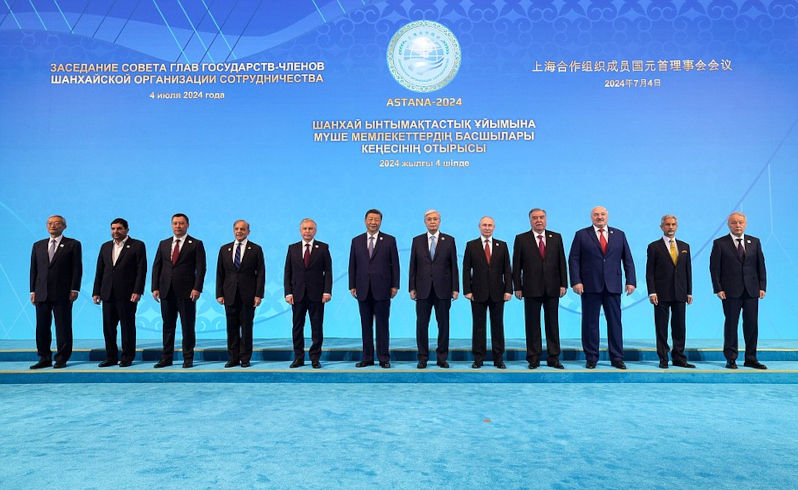The Astana Declaration - a challenge to US world power
August 4, 2024
The 24th summit of heads of state of the Shanghai Cooperation Organisation (SCO) concluded on 4 July 2024 in Astana, Kazakhstan. Its communique emphasised the group’s determination to enhance its role in influencing world events, an unmistakable challenge to US world leadership.
The SCO is a consequential world grouping. It was established in Shanghai in June 2001 with six founders – China, Kazakhstan, Russia, Tajikistan, the Kyrgyz Republic and Uzbekistan. With the addition of India, Iran and Pakistan, it now has nine members, plus three observers – Afghanistan, Belarus and Mongolia, and 14 dialogue partners including the UAE, Saudi Arabia and Tŭrkiye.
Its members are home to 40 percent of the world’s population, who collectively contribute US$23 trillion to global gross domestic product.
Sixteen world leaders attended the Astana summit including Xi Jinping of China, Vladimir Putin of Russia, Xi Jinping of China, Shehbaz Sharif of Pakistan, Recep Tayyip Erdogan of Tŭrkiye, Ilham Aliyev of Azerbaijan, and UN General Secretary Antōnio Guterres. India was represented by External Affairs Minister SubrahmanyanIn Jayshankar. During the summit, Belarus was admitted as a full member and China assumed the group’s rotating annual presidency.
The Astana declaration includes the usual principles: commitment to build a more representative, democratic, equitable and multi-polar world, respect for its members’ territorial integrity, non-interference in its members’ internal affairs (China regards its claim to Taiwan strictly as an internal affair), and the right of SCO members independently to choose their political and economic paths. Its members are also determined to boost the group’s international influence, calling itself an important organisation in the multipolar world.
‘Multipolar’ is interesting. China is thought in western capitals to be engaged in a bipolar contest with the US. If there is another pole, that suggests Russia.
Similar sentiments to the Astana Declaration, especially the need for peace, can be found in the communiques of almost every gathering attended by the United States, including its meetings with ASEAN at East Asian Summits. The communiqués usually emphasise peace, and support territorial integrity, and the right of members and associated countries to independently choose their own political and socio-economic paths.
In reinforcement of such principles, all states which join ASEAN meetings must ratify the 1976 Treaty of Amity and Cooperation (TAC). The United States is one of the 51 high contracting parties which have done so. The TAC was amended in 1987, 1998 and 2010, but its core principle of peaceful coexistence and friendly co-operation remains unaltered. The threat or use of force between the parties is forbidden, as it is in the UN Charter, but is repeatedly ignored.
What also undermines United States adherence to the TAC is the web of military bases it operates in North East Asia (Guam, Japan, ROK) to enforce its dominance in that area and further afield.
As for South East Asia, after evacuating its bases in Thailand and the Philippines at the end of the Vietnam War, the United States is making a comeback. It has negotiated an Enhanced Defence Cooperation Agreement with the Philippines, and now has a new air base in Basa in Pampanga, and is establishing others at Fort Magsaysay in Nueva Ecija, in Palawan, Cebu and Cagayan de Oro. None yet in Thailand or other ASEAN countries, although some of them, notably Singapore, regularly send soldiers and airmen for training in the US.
Meanwhile, US military surveillance assets continue to grow. At its Grand Forks Operational Base in North Dakota, the US Space Development Agency is planning to launch an extra 250 military surveillance satellites, the ‘tip of the spear’ designed to monitor Chinese and Russian military activities around the globe more closely than ever.
The much-publicised Quad is supposed to be a consulting arrangement between the United States, Japan, Australia and India to consider what to do about China’s growing regional influence. But India is a somewhat equivocal partner, as demonstrated by its membership of the SCO: a foot in both camps, or none. Turkey demonstrates a similar equivocation by being a member both of NATO and the SCO.
The world is changing, particularly in our region, and Australia should change with it. The Chifley government saw the brief post-war as an opportunity to join India, Indonesia and other newly-independent states in their aspiration for non-alignment. But under Menzies we eschewed all opportunities to make our presence or interests felt at post-war non-aligned meetings, starting with the 1955 Bandung Conference. And on it went with Australia joining wars against ‘communists’ in Malaysia, Indonesia and Vietnam.
After an interregnum when Australia collaborated with Asian neighbours to our mutual advantage, both sides of politics have been seduced by America’s sino-phobia. The advent of AUKUS, particularly the possibility of acquiring nuclear-powered submarines at enormous cost from the United States, compounds our lack of freedom of movement in foreign policy and defence choices. In a fast-moving world of waning US power, we are caught flat-footed, without the discretion to adapt to shifting alliances.
